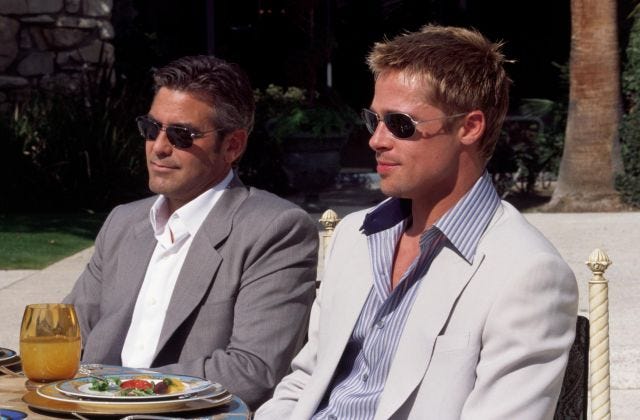Thanksgiving has come and gone, which means it's officially the holiday season! I could not be happier, not only because it brings us to the end of 2020 — which, if it doesn't quite take away the wallop of 2020, will at least notch us closer to a new regime — but because I just love the holiday season. I can't help it, I'm a sap like that.
This week we are not talking Christmas films (ttyl, tho), but we are dealing in films that hit those same sweet spots of delightful and dreamy in their own ways. First up we've got Cate on the naturalistic rhythms of When Harry Met Sally. Then we've got Zosha on the slick devilish allure of Ocean's Eleven. Read on, and then pay that goodwill forward.
Cate on When Harry Met Sally
Written by: Nora Ephron
Directed by: Rob Reiner
Distributed by: Columbia Pictures
I have to admit that I wasn’t sure that I would enjoy this film. I put it off for weeks, worried that I would find one of the most critically lauded films of the 21st century to be merely mediocre. I’d recently started reading about Nora Ephron’s life and work, and obviously, that meant a foray through her films. But when I first saw Sleepless in Seattle a few years ago... I hated it and I am still happy to tell anyone who wants to listen that it’s not a proper romcom if the leads DON’T KISS IN THE END.
In any case, I approached When Harry Met Sally with trepidation because with such an outsized reputation preceding it, I figured the best I could be was let down. Thankfully, after biting the bullet, I’m pleased to report that the film is just as delightful as advertised.
I’m sure I don’t have to tell you, but the movie follows Sally Albright (Meg Ryan) and Harry Burns (Billy Crystal) first from Chicago to New York on a post-college road trip, and then across 12 years as their chance re-encounter turns into a budding friendship and eventually to romance. For most of the span of the film, the two are merely platonic best friends, despite Harry’s insistence on their first meeting that men and women can never be “just friends” because the men will always want to sleep with the women.
There’s a very particular feel that films released in the ‘85-‘95 period all share. It’s hard for me to describe but I know it when I see it, and When Harry Met Sally has it in droves. The moody, “times are changing” atmosphere of the story compliments its themes perfectly. Ephron was known for her work writing about women and the conversations they were having that no one ever acknowledged in public. When Harry Met Sally brings those conversations to the fore, and by building a deep friendship between its leads, it makes their eventual romance feel believable and earned.
Meg Ryan as Sally is all bright-eyed ingenue in the best way. Her incredulous reactions to Harry’s sardonic humor make her a protagonist you want to root for. She enjoys Harry’s company and they’re friends, but she has her ways, her limits, and her boundaries and she doesn’t plan to budge. I liked Harry’s lowkey gaslighting a lot less, but this was still the most I ever enjoyed watching Billy Crystal onscreen. His smarminess is dialed all the way down from douchebag to “guy who knows he’s clever.” Still on the irritating side of the spectrum, but much closer to tolerable than I’ve been accustomed to.
The thing that saves the Harry character for me is less that he’s charming and more that he’s so clearly charmed by Sally. He can’t explain to himself why he’d always like to be around her, but he’s his best self when he is. It’s his first experience caring about the well-being of a woman he isn’t trying to sleep with, and it makes him softer, more compassionate, and generally more appealing. The way Harry looks at Sally makes it obvious from the start that they will end up in love. It’s not lust or attraction that moves him, but admiration.
As the archetypes for men and women onscreen for 30 years now, both the characters and the film hold up surprisingly well. The banter between the leads is believable, charming, fun, and frequently funny, and their dry humor injects an extra zest into scenes that should be bizarre or off-putting. From Harry’s retelling of the dissolution of his marriage— as he does the wave at a baseball game— to Sally’s full-throated simulation of an orgasm in a packed diner, both characters are their own straight man, never breaking the scene by acknowledging its internal absurdity.
What I admired most about this “enemies to friends to lovers” tale is that it felt naturalistic. Harry and Sally are frank and open with each other because they’ve taken sex off the table, and it allows them to be their full selves with each other in a way that likely would never have happened if they’d tried dating first. When they do sleep together— in a moment of both their weakness— the fallout happens not because they are a bad match, but because they’ve each changed the nature of the most important relationship in their lives, and they don’t have the other to talk about it with. It’s a fight that felt like the natural conclusion of years of closeness and intimacy that had largely gone unspoken.
When Harry Met Sally works because it gives us two protagonists with equal investment in the relationship at play. Rather than focus on tittering women who just can’t understand the men in their lives, it shows us that the men too are confused and fumbling, trying to figure out how to build relationships that endure. I really, really, really enjoyed it, and I can’t wait to devour everything else Nora Ephron has ever had a hand in.
Zosha on Ocean's Eleven
Written by: Ted Griffin
Directed by: Steven Soderbergh
Distributed by: Warner Bros. Pictures
There might be more perfect movies, but there are maybe not better movies than Ocean’s Eleven. It is at the top of a mental list of mine, films that I revisit with trepidation as if their magical act might finally be seen through; miraculously, it never is.
You know the story of Ocean’s Eleven, or at least you know the story-ish: Danny Ocean (George Clooney, maybe never better?) is planning a heist—the heist, the biggest heist that this town [Las Vegas] has ever seen. Knocking over three casinos in one night, to the tune of $160 million and change, split 11 ways among the titular gang.
Say what you will about heist films, but I just think they’re neat. The Robin Hood element doesn’t hurt — at its best a heist film is like a crime procedural, except you’re robbing the bad guys instead of rooting for them — but there is just something so comforting about the competency porn of a heist movie. And as I’ve hinted above, Ocean’s Eleven is no exception! In fact, it is the glitzy, shiny, gleaming gold standard, honestly. It is neatly divided into chunks — getting the gang together; getting the heist together; getting the goods — and damn if it doesn’t move like clockwork. There’s details galore, plants and payoffs, and, perhaps most triumphantly, flavor.
I think this is the thing that can get lost in so many attempts at genre work or grander artist imprint. Something like The Undoing or The Crown (two lackluster-y things that are also on my plate this month) mistake monotony for a style. Everyone talks the same, acts the same, and moves the same, and that is how you make a noir or a drama feel like a cohesive version of those things. But it’s so much more complicated than that. You need smaller character beats, little moments for actors to play, or lines to breathe. It’s an inclination Ocean’s Eleven splashes around in like a kiddy pool, providing a dry wit as the background of every scene, but still making the characters feel individual. They all want to get paid, but Matt Damon wants to prove himself; the car brothers want to goof; Don Cheadle wants to do science and have a terrible British accent; Rusty (Brad Pitt, perfect) wants to eat. Danny wants to get the heist going, but he also wants to be on top, and who can’t relate.
The emptiest part of the film is what’s supposed to be the heart, the gas in the engine: Tess (Julia Roberts), the ex-wife who Danny’s chasing after in his own way, who is all muted reactions and internal gear-turning to the men of the film. While Andy Garcia plays Terry like an unraveling serial killer, Tess is stuck as a vacant blink. But even still she gets to do fun line readings with Clooney like when he thinks he’s got his gotcha with “Does he make you laugh” and she bats back: “He doesn’t make me cry.”
It is a line I have turned over and over in my head since I watched it — a razor edge from stupid, like all the best lines, but snatching sentiment from the jaws of defeat. Roberts imbues it with such weight you can practically see all the hurt Danny Ocean has wrought. No matter what Danny Ocean accomplishes here, no matter how George Clooney has built a career out of beguiling women in front of windows, he can’t undo that.
And yet still we root for him and his 11 because people worth three-quarters of a billion dollars are on the other side and they are such characters, endearing even when nothing is happening. Heist movies (like mysteries) benefit from a wide purview. As they stretch and sprawl they unroll gems in front of our eyeballs in the form of these tiny details that add up to a bigger picture. Just as much as Death on the Nile, Ocean’s Eleven demands our attention, makes full use of its character introductions and interactions, motivations and machinations. It’s what makes Ocean’s Eleven a Christmas morning as a movie, even decades later. It is a ride down a lazy river but still tight as hell.
Assorted Internet Detritus
Cate: This week I'm thankful for all the good shit to read on the internet. In no particular order: this essay that properly articulates my ongoing frustration with COVID-era television, this cheeky piece in the New Times about the special relationship African mothers have with the late Princess Diana, this examination of how the Kardashians finally fell out of favor, this delightful takedown of Netflix's The Queen's Gambit (a show I enjoyed very much), this moving personal essay from Lena Dunham about her struggle to confront her own infertility, this essay about the classic Cher film Moonstruck on the occasion of its addition to the Criterion Collection, the first missive from a new newsletter by one of my all-time favourite writers Hunter Harris, and finally, this deep-dive into of the glut of politically meaningless black horror films, written by yours truly. I worked really hard on it and I'm quite proud of what I put together, so I'd love if you gave it a read!
Zosha: This week has been a short working one but a sleepy mental one for me, so I have not read a whole ton on-internet, tbqh. But I did love every bit of this piece about not meeting nazis halfway, and started snaking my way through this long piece about space junk and its many dangers. I also had a good time with a trans reading of Young Frankenstein and the issue of peak male performance.
We'll be back next week with Issue #28!
Decking the halls and yelling about movies,
Zosha + Cate <3
Twitter: @30FlirtyFilm
Instagram: @30FlirtyFilm












